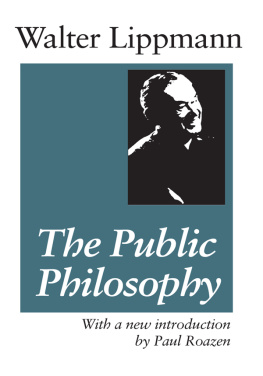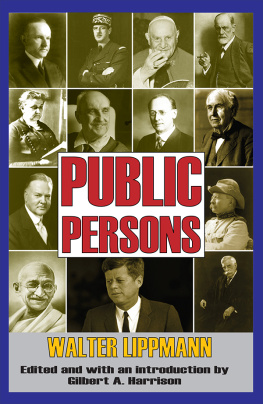INTRODUCTION
The most incisive comment on politics to-day is indifference. When men and women begin to feel that elections and legislatures do not matter very much, that politics is a rather distant and unimportant exercise, the reformer might as well put to himself a few searching doubts. Indifference is a criticism that cuts beneath oppositions and wranglings by calling the political method itself into question. Leaders in public affairs recognize this. They know that no attack is so disastrous as silence, that no invective is so blasting as the wise and indulgent smile of the people who do not care. Eager to believe that all the world is as interested as they are, there comes a time when even the reformer is compelled to face the fairly widespread suspicion of the average man that politics is an exhibition in which there is much ado about nothing. But such moments of illumination are rare. They appear in writers who realize how large is the public that doesn't read their books, in reformers who venture to compare the membership list of their league with the census of the United States. Whoever has been granted such a moment of insight knows how exquisitely painful it is. To conquer it men turn generally to their ancient comforter, self-deception: they complain about the stolid, inert masses and the apathy of the people. In a more confidential tone they will tell you that the ordinary citizen is a "hopelessly private person."
The reformer is himself not lacking in stolidity if he can believe such a fiction of a people that crowds about tickers and demands the news of the day before it happens, that trembles on the verge of a panic over the unguarded utterance of a financier, and founds a new religion every month or so. But after a while self-deception ceases to be a comfort. This is when the reformer notices how indifference to politics is settling upon some of the most alert minds of our generation, entering into the attitude of men as capable as any reformer of large and imaginative interests. For among the keenest minds, among artists, scientists and philosophers, there is a remarkable inclination to make a virtue of political indifference. Too passionate an absorption in public affairs is felt to be a somewhat shallow performance, and the reformer is patronized as a well-meaning but rather dull fellow. This is the criticism of men engaged in some genuinely creative labor. Often it is unexpressed, often as not the artist or scientist will join in a political movement. But in the depths of his soul there is, I suspect, some feeling which says to the politician, "Why so hot, my little sir?"
Nothing, too, is more illuminating than the painful way in which many people cultivate a knowledge of public affairs because they have a conscience and wish to do a citizen's duty. Having read a number of articles on the tariff and ploughed through the metaphysics of the currency question, what do they do? They turn with all the more zest to some spontaneous human interest. Perhaps they follow, follow, follow Roosevelt everywhere, and live with him through the emotions of a great battle. But for the affairs of statecraft, for the very policies that a Roosevelt advocates, the interest is largely perfunctory, maintained out of a sense of duty and dropped with a sigh of relief.
That reaction may not be as deplorable as it seems. Pick up your newspaper, read the Congressional Record, run over in your mind the "issues" of a campaign, and then ask yourself whether the average man is entirely to blame because he smiles a bit at Armageddon and refuses to take the politician at his own rhetorical valuation. If men find statecraft uninteresting, may it not be that statecraft is uninteresting? I have a more or less professional interest in public affairs; that is to say, I have had opportunity to look at politics from the point of view of the man who is trying to get the attention of people in order to carry through some reform. At first it was a hard confession to make, but the more I saw of politics at first-hand, the more I respected the indifference of the public. There was something monotonously trivial and irrelevant about our reformist enthusiasm, and an appalling justice in that half-conscious criticism which refuses to place politics among the genuine, creative activities of men. Science was valid, art was valid, the poorest grubber in a laboratory was engaged in a real labor, anyone who had found expression in some beautiful object was truly centered. But politics was a personal drama without meaning or a vague abstraction without substance.
Yet there was the fact, just as indisputable as ever, that public affairs do have an enormous and intimate effect upon our lives. They make or unmake us. They are the foundation of that national vigor through which civilizations mature. City and countryside, factories and play, schools and the family are powerful influences in every life, and politics is directly concerned with them. If politics is irrelevant, it is certainly not because its subject matter is unimportant. Public affairs govern our thinking and doing with subtlety and persistence.
The trouble, I figured, must be in the way politics is concerned with the nation's interests. If public business seems to drift aimlessly, its results are, nevertheless, of the highest consequence. In statecraft the penalties and rewards are tremendous. Perhaps the approach is distorted. Perhaps uncriticised assumptions have obscured the real uses of politics. Perhaps an attitude can be worked out which will engage a fresher attention. For there are, I believe, blunders in our political thinking which confuse fictitious activity with genuine achievement, and make it difficult for men to know where they should enlist. Perhaps if we can see politics in a different light, it will rivet our creative interests.
These essays, then, are an attempt to sketch an attitude towards statecraft. I have tried to suggest an approach, to illustrate it concretely, to prepare a point of view. In selecting for the title "A Preface to Politics," I have wished to stamp upon the whole book my own sense that it is a beginning and not a conclusion. I have wished to emphasize that there is nothing in this book which can be drafted into a legislative proposal and presented to the legislature the day after to-morrow. It was not written with the notion that these pages would contain an adequate exposition of modern political method. Much less was it written to further a concrete program. There are, I hope, no assumptions put forward as dogmas.
It is a preliminary sketch for a theory of politics, a preface to thinking. Like all speculation about human affairs, it is the result of a grapple with problems as they appear in the experience of one man. For though a personal vision may at times assume an eloquent and universal language, it is well never to forget that all philosophies are the language of particular men.






